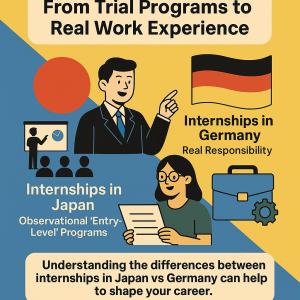When it comes to internships in Japan vs Germany, the expectations and experiences couldn’t be more different.
What comes to mind when you hear the word “internship”?
In this article, I’m sharing some insights for junior professionals and university students. I’ll lay out how internships are perceived differently around the world. And what that says about where your career really begins.
In Japan, internships are often seen as “workplace experiences” or an extension of company info sessions. But here in Germany, where I currently live, internships are considered genuine work experience. Even as a student, you’re treated as a full team member from day one, contributing to projects and client work with real responsibility.
Internships in Japan vs Germany: Contrasting Entry-Level Observation with Real Responsibility
Internships in Japan: A “Preview” of Your Career.
In Japan, internships are typically short—lasting only a few days to a week—and focus on understanding the industry or company culture. For companies, internships often serve as a form of branding, with programs centred around information sessions, group discussions, and case studies rather than hands-on work. Students tend to visit multiple companies to explore options, prioritising “the number of connections” they make rather than the depth of the experience itself. This approach fits Japan’s culture of mass hiring of new graduates and the idea that training happens after joining the company. It allows students to compare companies easily and adjust their career paths flexibly.
Internships in Germany: Responsibility from Day One
In Germany, internships are a whole different story. They are usually full-time (40 hours a week), lasting three to six months, and often paid. Students are expected to take on real tasks—whether in marketing, finance, or engineering—on the same level as full-time employees and are held accountable for their results. There is also a “Working Student” system, where students work around 20 hours per week while studying. These roles involve meaningful responsibilities such as research, document creation, and competitive analysis—work that truly strengthens a résumé. The environment naturally equips students with practical work skills before they even graduate.
Why Internship Experience Matters on Your Résumé
As a recruiter reviewing countless CVs, I can say international internship experience always stands out.
For example, it demonstrates:
- Language proficiency and adaptability to different cultures
- Market understanding of the country where the internship was completed
- Concrete contributions through tasks and deliverables
Such experiences are evaluated as solid achievements, not just potential. On the other hand, due to their shorter duration and content, Japanese internships are less often considered “real work experience,” with part-time jobs sometimes weighing more on a résumé. Your Career Depends on Where and How You Gain Experience
When thinking about your career, it’s easy to focus only on “which company to join.” But what really matters is what kind of experience you build—the work you do and the environment in which you grow.
Both Japan and overseas internships have their strengths. That’s why it’s essential to ask yourself:
- What skills do I want to develop?
- What work style suits me best?
Choose internships with an eye on the quality of experience, not just the name of the company. Understanding the differences between internships in Japan vs Germany can help students and young professionals choose experiences that truly build their careers. And if you’re already a working professional, take time to explore what kinds of real tasks young talents have handled during their internships. Looking deeper into these experiences can give you fresh perspectives.
I’ll continue sharing insights as a recruiter on the differences in work styles and career mindsets between Japan and abroad. If you’re curious to learn more or need guidance for your own career, feel free to reach out! Thank you for reading, Nodoka.

Cogs is an executive search and recruitment agency specialising in connecting creative-minded individuals with global career opportunities.
For further reading and resources, check out our blog: Cogs Agency.
Reach out by sending an e-mail to contact@cogsagency.com , check out our LinkedIn page for the latest job updates and read more of our articles.
- Categories
- Blog
- Personal Development